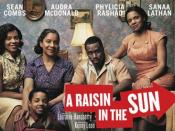"A Raisin in the Sun" In Lorraine Hansberry's "A Raisin in the Sun," the Younger family faces numerous situations and dilemmas that obstruct their path to a better life and future. They struggle in obtaining money, finding their identity, and dealing with a prejudice society. Though, these conflicts only increase their pride, esteem and dignity throughout the drama.
A place of poverty and poor communities""this is the south side Chicago where the Youngers preside. Their scarcity of money and short income places them into an affordable apartment with two rooms, shared among five members, and one bathroom. The family is in a constant feud about the ten thousand-dollar insurance check which is to be arriving in the mail shortly. Lena Younger, more widely known as mama, achieves her dream of buying a house and immediately puts thirty-five hundred dollars down on a new house and sixty-five hundred into Walter's care.
All hope is lost when Walter loses the money and the family ends up back to where they started, with nothing. Though the money is gone, this lifetime dream of Mama and Ruth is not destroyed. They keep their pride and dignity and contribute to sacrificing their time into working endless hours to keep the house. Ruth says, "Lena""I'll work"æ I'll work twenty hours a day in all the kitchens in Chicago"æ I'll strap my baby on my back if I have to scrub all the floors in America and wash all the sheets in America if I have to""but we got to move"æ." Through the struggle of poverty, one can still achieve success by keeping their pride and confronting the problem.
Walter often struggles with his identity and individuality as a person. He feels as if an empty life lies ahead of him with no future. Walter encounters his problem and comes up with an idea of opening up his own business, to get control over his life, and puts up all his effort to achieve it. Even though his goal is not achieved, Walter still succeeded in his mental spirit and his attitude changed near the end of the play.
Another obstacle that faces the Youngers is a severe and harsh circumstance of racism and discrimination. Mr. Lindner, a community representative for Clybourne Park Improvement Association, and the residents of the community feel that black families and white families wouldn't be suitable for living together in the same neighborhood. "It is a matter of the people of Clybourne Park believing, rightly or wrongly, as I say, that for the happiness of all concerned that our Negro families are happier when they live in their own communities," states Mr. Lindner. The Youngers' reaction towards this is in a calm manner, with their dignity still at hand. The family pulls through, disregards the racism and moves into the new house nonetheless. ""æAnd we have all thought about your offer-- And we have decided to move into our house because my father--my father--he earned it for us brick by brick." In conclusion, one can just about achieve the most impossible of dreams as long as they stick to their decision and confront the struggles involved. The Youngers were a family of diminutive material possessions, but what they did have, dignity, counted the most. Through facing the most difficult of times""obtaining money, finding their identity, and dealing with racist attitudes""the Youngers went on to finer things in life. Life may be coarse, cruel, and difficult, but as long as one pulls through, their troubles are reduced greatly.





